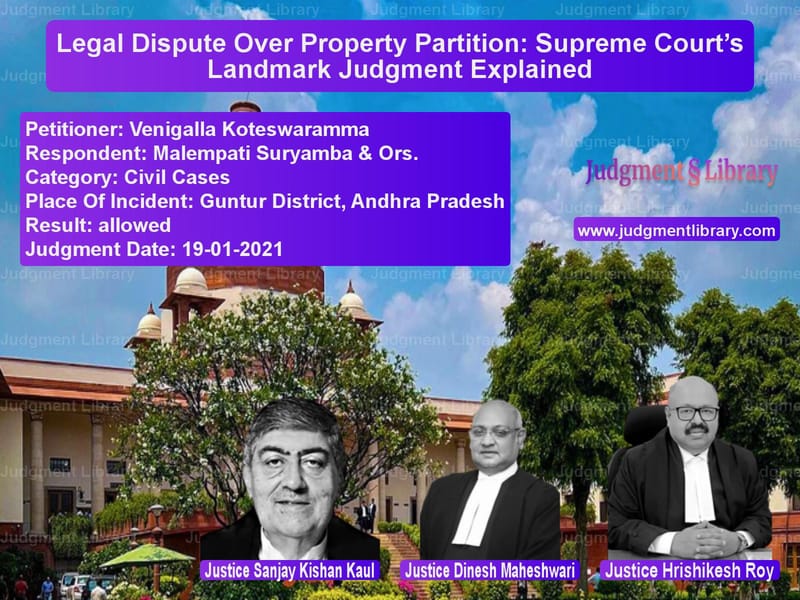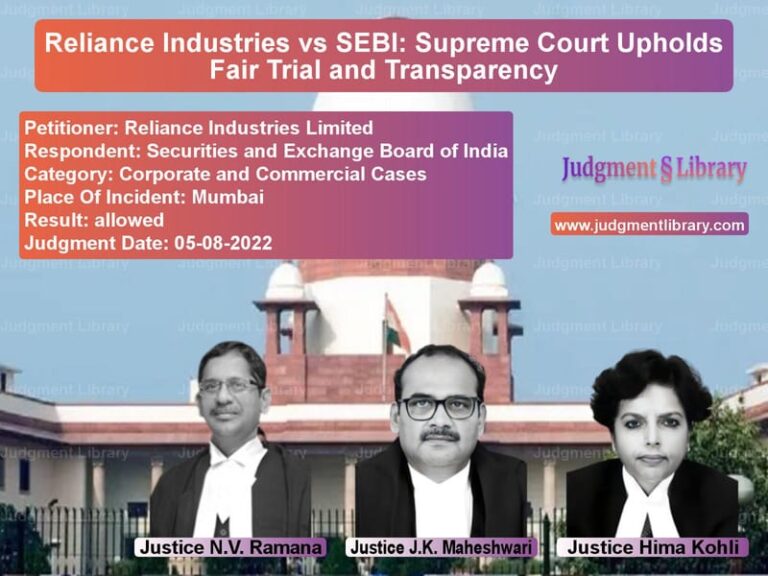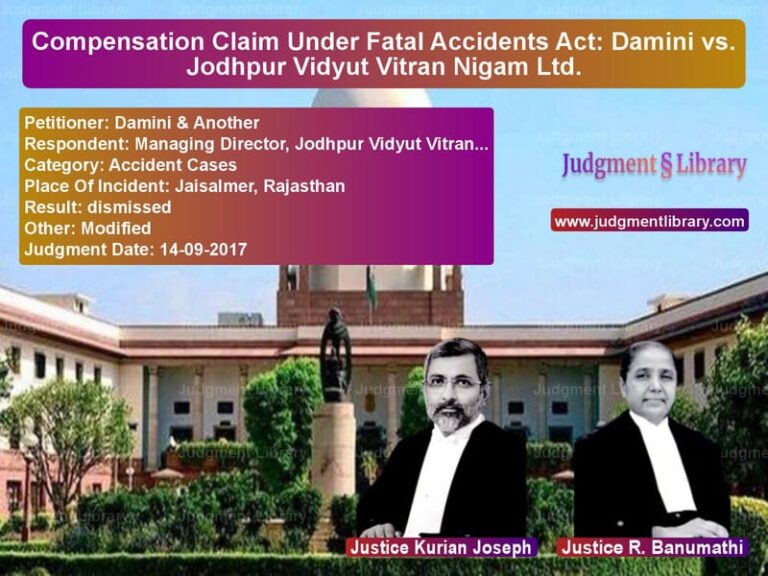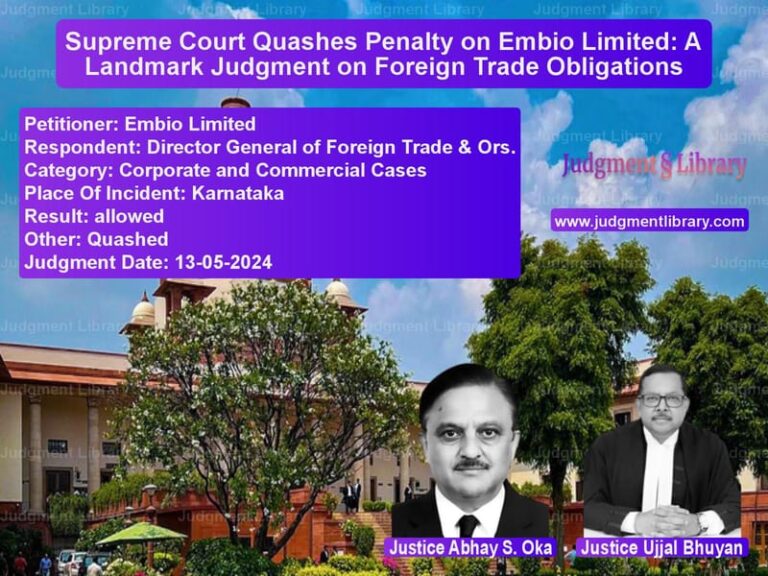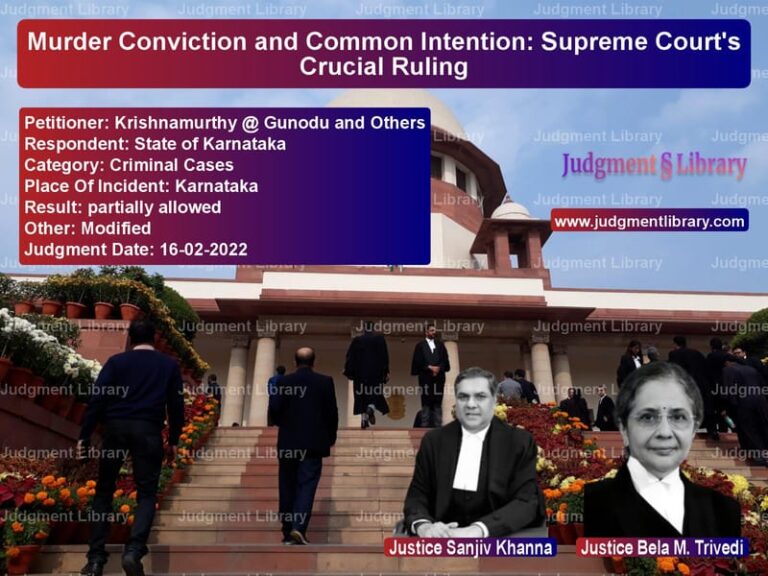Legal Dispute Over Property Partition: Supreme Court’s Landmark Judgment Explained
The Supreme Court of India, in the case of Venigalla Koteswaramma vs. Malempati Suryamba & Ors., resolved a long-standing property dispute by reinstating the Trial Court’s decision in favor of the appellant. The judgment addressed critical legal questions surrounding property partition, the validity of an unregistered sale agreement, and the procedural irregularities that affected the High Court’s ruling.
The case centered around a legal battle for partitioning properties inherited from Annapurnamma, the stepmother of the appellant, who allegedly left behind a controversial sale agreement and a Will. While the Trial Court dismissed these documents as fabricated, the High Court partially overturned its decision, leading to the present appeal before the Supreme Court.
Background of the Case
The dispute originated from a suit filed by the appellant before the Subordinate Judge’s Court, Narasaraopet, Guntur District, Andhra Pradesh. She sought a declaration that the properties in question were joint family properties and should be divided among the heirs. The primary contesting respondents, who were the heirs of the alleged vendee under the sale agreement, disputed this claim by asserting that Annapurnamma had validly transferred the properties before her demise.
The Trial Court, after reviewing evidence, found that the sale agreement and Will were fabricated to deprive the appellant of her rightful share. However, the High Court, in appeal, upheld the Trial Court’s ruling on the Will but reversed its findings on the sale agreement. This resulted in an inconsistent decree that favored the respondents, leading the appellant to challenge the decision in the Supreme Court.
Petitioner’s Arguments
The appellant presented the following key arguments before the Supreme Court:
- The alleged sale agreement was fraudulent and had been fabricated to obstruct her inheritance rights.
- The agreement had never been registered, and there was no proof of possession or consideration paid by the alleged vendee.
- The absence of any suit for specific performance by the respondents indicated that they had no genuine claim over the property.
- The High Court’s reversal on the sale agreement led to an inconsistent decree, as it invalidated the Will but upheld an unproven sale agreement.
- The appeal before the High Court had abated due to the failure to substitute legal heirs of a deceased respondent, making it legally incompetent.
Respondents’ Arguments
The respondents countered with the following claims:
- The sale agreement was a genuine transaction executed by Annapurnamma in her lifetime.
- The appellant’s suit was incomplete because she failed to seek a formal declaration nullifying the sale agreement.
- The agreement was supported by documentary evidence and witness testimony that established possession and consideration paid.
- The appeal was still maintainable despite the death of a respondent, as the right to sue survived to the remaining legal heirs.
Supreme Court’s Analysis and Findings
1. Abatement of Appeal
The Supreme Court found that the High Court had proceeded with the appeal despite the death of a key respondent and without substituting his legal heirs. This procedural defect rendered the appeal legally incompetent. The Court stated:
Read also: https://judgmentlibrary.com/supreme-court-grants-interest-on-solatium-in-land-acquisition-case/
“The appeal against a deceased respondent abated upon failure to substitute legal representatives, making the proceedings fundamentally flawed.”
2. Validity of the Sale Agreement
The Court scrutinized the evidence presented regarding the sale agreement and found multiple inconsistencies. The respondents failed to provide convincing proof that consideration was paid or that possession had been transferred. The Court noted:
“An unregistered sale agreement, unsupported by evidence of execution or consideration, cannot be given precedence over lawful inheritance rights.”
The Supreme Court reaffirmed that partition cannot be denied based on unverified claims of prior sale.
3. Inconsistencies in the High Court’s Judgment
The Supreme Court criticized the High Court for delivering an inconsistent ruling. By invalidating the Will while upholding an alleged sale agreement that stemmed from the same source, the High Court contradicted its findings. The Supreme Court observed:
“The High Court’s decision led to an anomaly where the Will was dismissed as invalid, yet the sale agreement, which lacked greater legitimacy, was upheld. Such contradictions must be rectified.”
4. Reinstatement of the Trial Court’s Decision
Based on these findings, the Supreme Court reinstated the Trial Court’s ruling, ensuring that the appellant’s partition claim was upheld.
Supreme Court’s Verdict
The Supreme Court issued the following key directives:
- The appeal before the High Court was deemed incompetent due to abatement.
- The Trial Court’s decree was restored, declaring the sale agreement null and void.
- The appellant’s claim for partition was allowed, entitling her to her rightful share in the property.
- The respondents’ claims were dismissed as legally unsustainable.
Conclusion
This landmark judgment establishes crucial legal precedents:
- Procedural compliance: Failure to substitute legal heirs in an appeal results in abatement.
- Protection of inheritance rights: Partition cannot be denied based on an unregistered and unproven sale agreement.
- Judicial consistency: Courts must ensure that findings on related documents (such as a Will and a sale agreement) are logically consistent.
- Fraudulent transactions: Claims of prior sale must be supported by clear evidence, failing which they cannot override inheritance laws.
By restoring the Trial Court’s ruling, the Supreme Court reaffirmed the importance of procedural integrity and substantive justice in property disputes.
Petitioner Name: Venigalla Koteswaramma.Respondent Name: Malempati Suryamba & Ors..Judgment By: Justice Sanjay Kishan Kaul, Justice Dinesh Maheshwari, Justice Hrishikesh Roy.Place Of Incident: Guntur District, Andhra Pradesh.Judgment Date: 19-01-2021.
Don’t miss out on the full details! Download the complete judgment in PDF format below and gain valuable insights instantly!
Download Judgment: venigalla-koteswaram-vs-malempati-suryamba-&-supreme-court-of-india-judgment-dated-19-01-2021.pdf
Directly Download Judgment: Directly download this Judgment
See all petitions in Property Disputes
See all petitions in Succession and Wills
See all petitions in Specific Performance
See all petitions in Damages and Compensation
See all petitions in Judgment by Sanjay Kishan Kaul
See all petitions in Judgment by Dinesh Maheshwari
See all petitions in Judgment by Hrishikesh Roy
See all petitions in allowed
See all petitions in supreme court of India judgments January 2021
See all petitions in 2021 judgments
See all posts in Civil Cases Category
See all allowed petitions in Civil Cases Category
See all Dismissed petitions in Civil Cases Category
See all partially allowed petitions in Civil Cases Category

